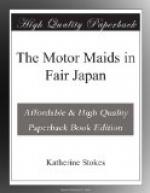O’Haru looked amiably sad. It is true that Onoye was on the pay roll of the household servants, but then, did not her mother do work for two when Onoye was not actively engaged? The Japanese reasons thus: if the work is done properly, it is of no consequence who does it. Certainly the machinery of the household moved on without a hitch. There was no cause for complaint, but it seemed to Miss Campbell that if Onoye received wages she should appear about the house. Her position, which was practically that of ladies’ maid, had been filled by one of the other small maids while O’Haru had covered up that vacancy by her own redoubled labors.
“Will you send Onoye to me, please,” ordered Miss Campbell. “I have some sewing for her to do.”
Poor O’Haru bowed. Her face looked wan and sad and it seemed to the Motor Maids that Miss Campbell might not have been so severe; but as a housekeeper, that small, gentle lady was a disciplinarian.
They waited with some curiosity for Onoye to appear. In five minutes O’Sudzu, one of the other maids, stood framed in the doorway like a Japanese souvenir post card life size. She bowed low and entered the room timidly.
“But I sent for Onoye,” exclaimed Miss Campbell.
O’Sudzu only smiled. She spoke no English.
“Onoye. Wish Onoye,” repeated Miss Campbell. She pointed to the door.
O’Sudzu departed.
O’Matsu appeared next, and after O’Matsu came O’Kiku, who was followed presently by Masako, until these successive apparitions of Japanese maids became positively bewildering. The girls were consumed with the giggles and Miss Campbell was scarcely able to maintain a serious expression.
“No, no!” she would say each time, “Onoye! Wish Onoye!”
At last O’Haru appeared once more.
“August one, much kindness bestow. O’Haru make sewing.”
“Where is Onoye? Where is your daughter?” demanded Miss Campbell.
O’Haru on her knees hung her head humbly.
“I think I know what’s the matter,” put in Mary. “Onoye is ill. I am sure it must be that.”
“Is there anything the matter with Onoye?” asked Miss Campbell, but apparently O’Haru’s English did not extend so far.
“Much sickness?” asked Billie.
O’Haru’s head sank lower and lower.
“Poor thing,” exclaimed Mary. “Onoye is ill, Miss Campbell, and O’Haru is afraid to say so.”
“You must not be afraid, O’Haru. If little daughter ill, we take care of her. Bring doctor. See?”
“No, no, Onoye better. Onoye soon well,” said the woman in a low voice. “Ask much pardons, gracious lady.”
“Can’t we see her?” asked Billie.
“Onoye see no one. Onoye only humble servant”
“Nonsense, she might be very ill,” put in Miss Campbell. “I’ll go with you now, O’Haru. Lead the way.”
The housekeeper gave a sigh of patient resignation and rose to her feet. Miss Campbell and the girls followed her down the long hall and across the passage to the servants’ quarters.




